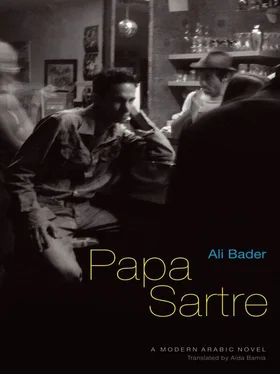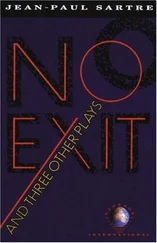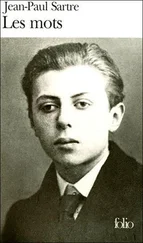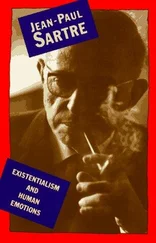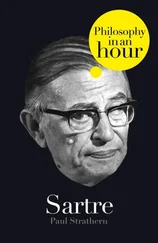“Certainly,” replied Ahmad.
24
The philosopher was convinced that if he could talk to her even through her friend, he could win her over. He wasn’t short on means to court her, but he didn’t know the path to her heart. Once she was with him he could employ his many unfailing methods: a promenade at sunset over the bridge crossing an icy river, being alone with her in a room filled with the sound of music and the smell of coffee, together watching ducks floating on a pond. He would rush her with a list of terms that revealed complex values such as: ‘existence,’ ‘eternity,’ ‘time,’ ‘absurdity,’ and ‘nausea.’ She would undoubtedly be seduced by this oriental philosopher who had come to Paris equipped with a powerful philosophy and who had memorized the entire philosophical lexicon.
Her own compatriots lacked this quality, and what does a waitress wish for more than to become friends with a philosopher? She’ll regret having made fun of him that one time in the past. She will kneel at his feet and admit her ignorance. Once she learns that he is the philosopher’s student and he himself is a philosopher, she’ll want to get close to him, love him, and discover his inner force that she once almost inadvertently destroyed. Abd al-Rahman reflected aloud, “Who is this Algerian compared to me!”
“No one” said Ahmad.
The philosopher wondered, puzzled “Why did she befriend him then?”
Ahmad offered, “Maybe because he keeps her.”
This was no challenge to the philosopher, who explained his plan, “If this is the case, I’ll take her out of the Café de Flore. I’ll even buy the café for her.”
There was only one other thing the philosopher wanted to inquire about, but he was a little embarrassed to ask. He took his hands out of his pockets, adjusted his glasses and walked gracefully, showing off his youthful body. He considered those characteristics central to his relationship with women. Then asked, “Is this Si Muammar handsome?”
Ahmad laughed loudly. “No, not at all. I saw him a few times in the Latin Quarter. His face looks like a cognac bottle.”
This response liberated Abd al-Rahman, who started laughing loudly. His eyes twinkled, and he felt joyful and relieved. His heart was beating fast, and his cheeks were hot from emotion. He asked Ahmad, “Is he as elegant as I am?”
“That would be impossible. He wears rags, like the Paris clochards. People say he is a drug addict and spends his time with users, pickpockets, and all the lazy guys.” Abd al-Rahman shouted joyfully, “That’s great!”
The philosopher adopted an affected walk, he was proud of his virility, his youth, his strength, and he made fun of effeminate young Frenchmen. The two friends stopped at a nearby café and were served by a plump waitress wearing country clothes under her red sweater. Her smile revealed a gold tooth. They ordered two beers. The place had a nostalgic ambiance, and Abd al-Rahman felt an inclination for jokes, wisdom, and lust.When Ahmad broached the subject, he was certain of the effect his words would have on his friend. He said, “There’s only one thing.” Abd al-Rahman asked what it was. Ahmad explained, “People say he is an existentialist.”
“Existentialist!” echoed Abd al-Rahman. He put down the glass of beer he had begun to drink. Ahmad’s revelation hit the philosopher like a thunderbolt. After a short silence he wondered, “Is it true, does he understand existentialism? How?” Ahmad wore a smile of compassion and looked for a way to lessen the shock on his friend. He felt the concern of the philosopher, his anxiety. “I don’t know much. They say he holds long discussions and describes himself as an existentialist.”
Abd al-Rahman was seriously worried. His expression betrayed deep hatred for this Algerian, but he was not crushed. He wet his dry lips with sips of beer. The philosopher was not convinced that Si Muammar could do anything except memorize a dictionary of existentialist terms. Whatever the existentialism of this man with the cognac-bottle-shaped face, it would be easy for Abd al-Rahman to best him, or so he thought. As soon as they met face-to-face he would inundate him with a series of philosophical definitions, even disconnected ones, then confuse him, surprise him, and overpower him verbally. Si Muammar wouldn’t be able to say a word.
The surprise would muzzle him. The waitress of Café de Flore would be stunned and overjoyed. She’d look at Abd al-Rahman with affectionate eyes, rush to his side, and tell him, “You are truly a philosopher, your abstruse words are magical!” She’d recognize the difference between a philosopher and a clochard, a true philosopher and an imposter. She would notice for the first time the richness of his soul, his calm, and poise. She would fall in love with his dreamy eyes, which resembled the eyes of prophets. She would listen to his prophetic voice, the voice of a messenger. She would become aware of his sensual side, his love of food, and earthly pleasures. She would note his handsome appearance, his lust, his sexual proclivities, and his philosophical personality.
“What more could a waitress want?” he shouted and hit the table with his hand, scaring his friend, whose neck had sunk into his coat. Ahmad regained his self-control quickly and said, “Don’t think of her as your significant other, yet.”
Teary-eyed, his cheeks burning red from emotion and the heat of love, Abd al-Rahman made a solemn declaration, “I will make her my significant other, believe me. I’ll be her gift.” Ahmad commented on his friend’s words saying, “This is real generosity. You are truly generous.” He resumed drinking his beer.
25
Ahmad managed to convince the philosopher of the soundness of his ideas. He was a gifted talker and persuasive speaker who used flattery to accomplish his aims and never defied his friend. His heavy drinking helped endear him to people. It gave him a hoarse voice that was comforting and friendly. His conversation was histrionic, but his tone was warm and reassuring. Presented in an agreeable way, his most insignificant ideas acquired importance.
The philosopher, on the other hand, was a practical man, and alcohol emboldened him. He asked Ahmad whether the meeting with the waitress would be easy, and Ahmad reassured him it would be. The philosopher was convinced of his ability to assert himself and his power over others. He held tight to this imaginary victory out of need for a relationship, and he was ready to conquer the waitress at Café de Flore to show her a pure image of himself, an unadulterated image free of scandal and sarcasm. He intended to reach his target by crushing his debaters and was intent on revenge to expunge the humiliation he had endured at her hands. He was bent on revenge at any cost to advance the image of a very proud man and to conceal his delicate, wounded soul.
Abd al-Rahman thought to himself, “Si Muammar will swallow the bait. Our friendship will be a mere device to reach the waitress of Café de Flore.”
He laughed noisily, and the whiskey vapors escaped from his mouth. He didn’t feel guilty, because he didn’t have a normal conscience. He had a philosopher’s conscience, a conscience that philosophy had killed. He didn’t think like normal human beings, who are considerate of others. His tyranny overpowered any benign feelings he had. He wanted to impose his will on those around him, and he found great pleasure in using his might. Thinking aloud he said, “No, he’ll not be my friend,” then fell silent.
“Of course not,” agreed Ahmad.
Abd al-Rahman explained his intentions to his friend, “I’m not trying to get to know him because of his black eyes. Rather I’m doing it for her eyes. I want to know him for a specific purpose. My aim is the waitress, not some beggar whose head looks like a cognac bottle. This isn’t a clochard’s friendship.” He spoke those words and bent his head over his chest.
Читать дальше
